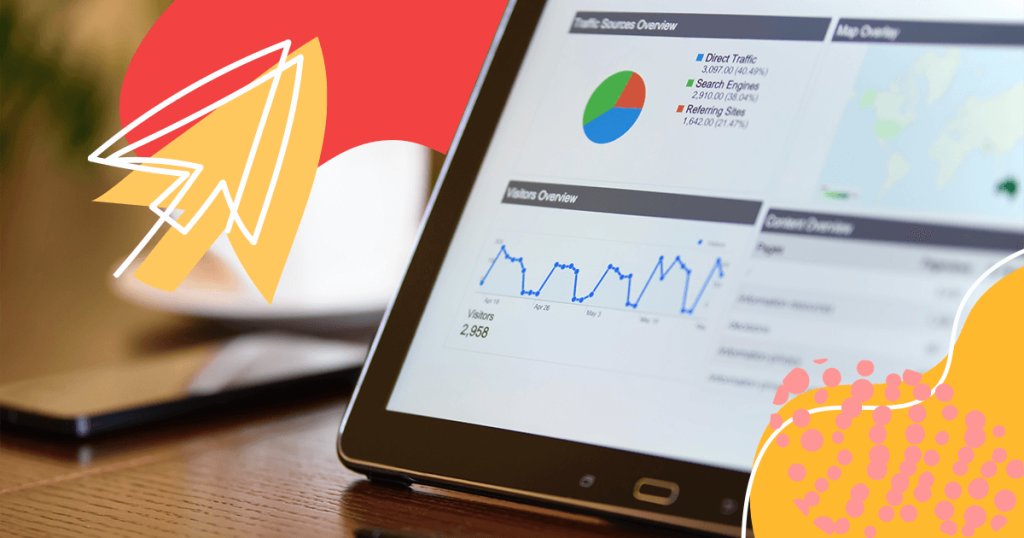With Google announcing the latest update to its analysis tool, the usual method of creating marketing reports and examining user interactions is not only threatened but will soon be extinct.
However, the crucial question is whether this change will improve digital marketing or frustrate strategies in reaching out and understanding our target audience.
Embracing the new change can be challenging initially, but it’s like learning a new skill. In time, you can discover and implement innovative ways to improve your marketing strategies and enhance your operations.
To guide you along the journey and get you prepared to use Google Analytics 4 (GA4) in 2023, we deep-dived into the following topics:
What Is Google Analytics 4 (G4) Anyway?
Google Analytics 4 is the latest update of Google Analytics. In 2019, Google announced this version to face ever-changing standards in measuring the performance of marketing strategies and driving business growth by showcasing the audience’s behavior better.
After its official release in mid-October 2020, we began to understand what analysis improvements GA4 had to offer.
Unlike its predecessor, Universal Analytics (GA3), Google Analytics 4 implements an event-based model to set digital marketing metrics and collect data.
Getting familiar with Google Analytics 4 is crucial for your business because GA3 will stop processing new hits on July 1, 2023.
Due to the recent release of Analytics 360, Universal Analytics 360 will get a 3-month extension before it stops processing new hits on October 1, 2023.
Among the significant things to note in the GA4’s implementation is cookieless tracking.
You may wonder how you can track metrics like user sessions without cookies, but that brings us back to what we stated before.
The shining factor of GA4 is its event-based model. Rather than cookies, this model only looks at interactions like clicks, conversions, and page loads, reporting them as events.
GA4 does not report metrics or gather data at the expense of customers’ security. Being more compliant with privacy laws like European Union’s General Data Protection Regulation (GDPR) and California Consumer Privacy Act (CCPA), GA4:
- Uses a data deletion system;
- Sets a 2-month data retention period by default;
- Does not store users’ IP addresses in its database.
With cross-platform data measurement, GA4 ensures flexibility in gathering various data metrics to handle changes in customer preferences and market strategies moving forward.
You can view your audience’s interactions with your website and application in a unified dashboard that makes it easy to extract insights and make better data-driven decisions.
GA4 also uses Google’s machine learning technology to predict and indicate insights from user behavior and conversions you may miss. The ever-learning system enables you to stay on trend as the system changes.
With GA4’s machine learning feature, you can quickly build new audiences likely to purchase, predict the ones that may churn, and generate recommendations you need to improve your marketing from vital insights.
If you don’t create a GA4 property, you would have to wait until GA3 shuts down and GA4 automatically becomes your main analytics interface. However, there are two reasons why you should avoid waiting.
- When Universal Analytics goes offline, you will lose all your historical data if you don’t migrate to GA4.
- There is no reason to wait because you can now set up Google Analytics 4 and enjoy its features.
How To Set Up Google Analytics 4
There are three ways to start using Google Analytics 4 as an editor or administrator.
1. Set Google Analytics 4 Data Collection for the First Time
You can use this method if you’re new to Analytics and ready to collect data for your website and app. You can also add a data stream and your Google Analytics code.
If you don’t already have one, you can start by creating an Analytics account, but if you have one, skip ahead to creating a new Google Analytics 4 property.
You can also set up a separate account for another business using these steps:
- After logging into the Google Analytics console, Select Admin at the bottom of the left pane.
- Click Create Account.
- Input your preferred name for the account and configure the data-sharing settings to control which data you share with Google.
- Click Next to add the first property to your newly created account.
To create a property:
- If you already have an account, click Create Property from the Admin page. If you are continuing from creating a new account, enter your desired property name and select your reporting time zone and currency. You can edit these details later from the Admin page.
- Click Next to select your industry.
- Click Create and accept the Analytics Terms of Service and the Data Processing Amendment. Then, you can choose a platform to start collecting data.
Read here for further steps on adding a data stream to your website or mobile application and setting up data collection for websites.
2. Add Google Analytics 4 to a Site With Universal Analytics
You can use GA4 Setup Assistant to create a Google Analytics 4 property that collects data alongside your existing Universal Analytics property.
Like this, your Universal Analytics property will continue to collect data while you access both using the Property selector in the Admin area. Before you follow these steps, ensure you have the Editor role.
- On the Admin page, select your desired account.
- Select the Universal Analytics property from the Property column that currently collects data for your website.
- Then, click GA4 Setup Assistant.
- Under “I want to create a new Google Analytics 4 property,” click Get Started.
- A “Create a new Google Analytics 4 property” screen will pop up with these options depending on how your website is currently tagged.
- Create and continue means you must continue to the “Set up a Google tag” page to select the option that best describes your situation and follow these instructions to finish creating your new GA4 property.
- Create property means that Analytics can reuse your existing Universal Analytics tagging for your GA4 property and create a connected site tag between your Universal Analytics and GA4 properties.
After you create a new GA4 property this way, you’ll see “You have successfully connected your properties” at the top of your Google Analytics 4 Property Setup Assistant page.
Take note of your GA4 property’s name and click See your GA4 property to view recommendations to finish setting up your new property.
Data can take up to 30 minutes to appear in your new Google Analytics 4 property. You can check Realtime to view live reporting and ensure that data is being collected.
3. Add Google Analytics 4 to a Website Builder Platform or Content Management System (CMS)
Use this method if you create your website using CMS like GoDaddy, HubSpot, and WordPress. To learn more about using this method, read the instructions on setting up GA4 for each platform.
Before we move on to highlight the key features that differentiate Google Analytics 4 from Universal Analytics, follow these steps to identify whether you have a Universal Analytics property or a Google Analytics 4 property:
- Besides the Analytics logo, click the down arrow next to your property’s name to open the property selector.
- Look at the number below the property name to identify the property type.
- Universal Analytics property IDs start with UA and end with a number (UA-XXXXXXXXX-1).
- Google Analytics 4 property IDs have only numbers (XXXXXXXXX).
What Is the Difference Between GA3 (Universal Analytics) and Google Analytics 4?
The most apparent difference between Universal Analytics and Google Analytics 4 is the property types they track. GA3 can only track website analytics as sessions, while GA4 can track website and application analytics as events.
The features that differentiate Google Analytics 4 from Universal Analytics include:
- Attribution models
- BigQuery connection
- No data limit
- Event tracking
Attribution Models
Attribution is how credit for conversions is assigned to different ads or clicks on your audience’s journey to convert. You can use attribution to gain insights into crucial touchpoints and channels that most convert users. An attribution model can be a rule, a set of rules, or an algorithm that determines how the credits are assigned to touchpoints.
Google Analytics 4 has three types of attribution models:
- Data-driven attribution – Uses machine learning algorithms to evaluate different user paths and considers factors like device type, number of ad interactions, and order of ad exposure. It helps you to analyze all the channels in your marketing strategy across the customer journey, from the first to the last interaction.
- Cross-channel rules-based model – Focuses only on the last channel the user clicked on before they converted and disregards the traffic.
- Ads-preferred rules-based model – Looks at the last Google Ad the customer clicked on before they converted and attributes all the conversion credits to it. It reverts to the cross-channel rules-based model If no ads are involved in the campaign.
BigQuery Connection
With Google Analytics 4, you can export data at no cost. In Universal Analytics, you had to upgrade to Google Analytics 360 to export raw data to BigQuery. While you can enjoy Google Cloud’s free tier to export data freely, you will be charged when you exceed 1TB of monthly querying and 10GB of storage.
Using BigQuery, you can store your data and use it later to optimize your strategy. You can also perform advanced data analysis, use your data for machine learning models and visualize your data to make better reports.
No Data Limit
The free version of Universal Analytics stopped at 10 million hits per month. This limit inconvenienced businesses to work with incomplete information after relying on sampled data.
Google Analytics 4 can only capture up to 500 different events. However, this limit is on the number of events — not the hits per month. Transitioning to Google Analytics 4 earlier means you can avoid the limit on the number of monthly hits as soon as possible.
Event tracking
Google Analytics 4’s event-based measurement model gives you a full view of the user’s customer journey across platforms.
With Universal Analytics, the customer lifecycle is set into independent sessions, making you piece everything together before you have a complete view.
When you measure how your users interact with your website and application, you can better understand how they move through the funnel and spot areas where they usually drop off or have a higher conversion rate.
This model can also help you reduce your time on user journey analysis.
Google Analytics 4 tracks four types of events:
- Automatically collected events – Google Analytics 4 collects these events by default. These events include the user’s first visit and when they start engaging with your website or application.
- Enhanced measurement events – These events are also enabled by default to allow you to get various data and disable them according to your preferences. They include outbound link clicks, searches on your website, and video engagement.
- Recommended events – Google Analytics 4 lists recommended events to help you track events outside the first two types. These recommendations are based on different types of websites, so you can easily find those that suit you. You have to manually implement these events according to Google’s instructions to use them.
- Custom events – If none of those above types meet your needs, you can build custom events according to the insights you got from your reports.
See the Power of Great Content With GA4
With the essence of website and application tracking providing critical insights that can help you implement ways to improve your customer journey, Google Analytics 4 is a crucial tool for any digital marketing strategy.
From building better strategies to analyzing them to understanding vital areas or segments that experience success or failure, you can improve your plans more efficiently and achieve your marketing goals faster.
Check out our Marketing Planning Bundle to build solid plans that can support your strategies. This package gives you a wealth of marketing and sales resources to help you analyze campaign results and set strategic goals.
Get started implementing execution and improvements along the journey that positively drives your brand’s growth!








